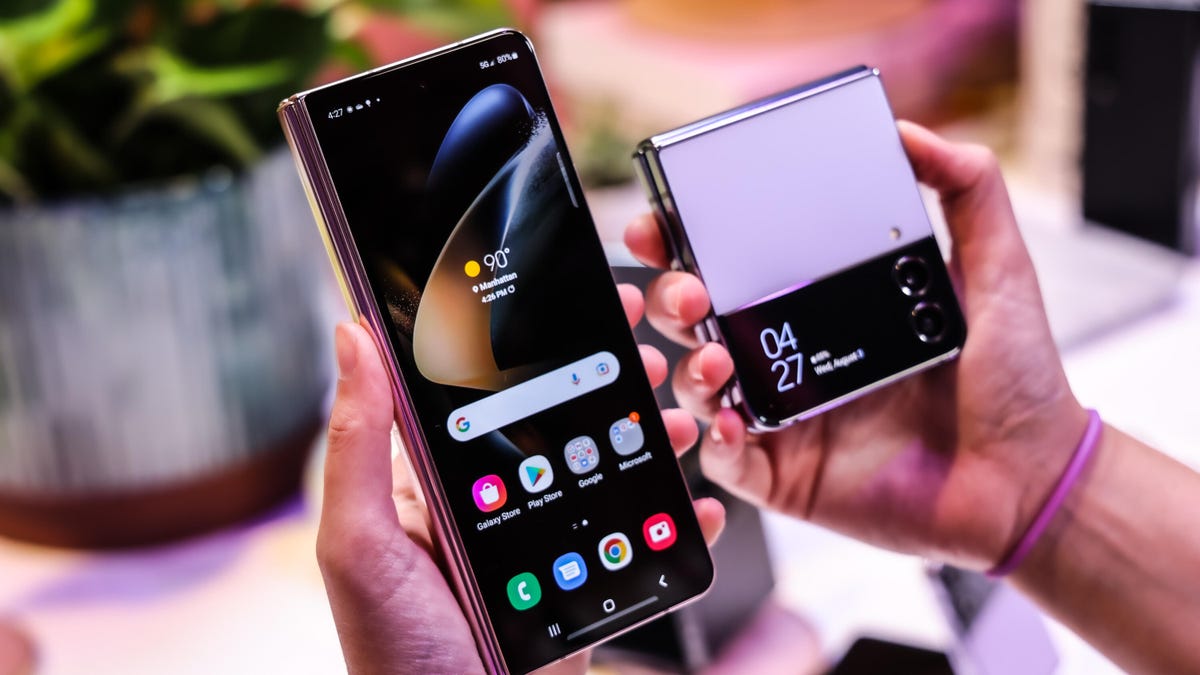The two biggest phone-makers are both trying to change the way we interact with our phones — but in very different ways. Apple is transforming the iPhone’s software and how it works with the iPhone 14 Pro and Pro Max phones. Samsung, by contrast, is updating the physical shape of the smartphone through its Galaxy Z Fold and Galaxy Z Flip line of foldables.
Apple unveiled the iPhone 14 Pro line at its “Far Out” event on Wednesday, and one of its standout new features is a redesigned notch area called the Dynamic Island. It’s a pill-shaped cutout for the front camera and Face ID sensors that Apple has also repurposed as a miniature secondary display for showing notifications and other content.
At first glance, Apple’s Dynamic Island and Samsung’s foldable phones have little in common, if anything. But the intention behind both is the same: to improve how our phones display apps and surface information.
The iPhone 14 Pro’s Dynamic Island explained
The Dynamic Island is essentially Apple’s answer to faster multitasking on the iPhone. While Android phone-makers like Samsung support the ability to open multiple apps at once on screen, Apple instead uses the Dynamic Island to expand and contract to show contextual information. It can expand to show alerts and may change shape depending on the app.
For example, the Dynamic Island can show the song you’re listening to even when you’re on the home screen. If you have a timer running at the same time, it’ll split the timer into its own bubble positioned next to the music playback information, so that you can view both without having to switch between apps. Similarly, you can see turn-by-turn directions on the Dynamic Island without having to jump from one app to another. The same goes for sports scores.
Apple says the goal behind the Dynamic Island is to clearly show information without distracting from the app you’re in. “With this change, we reconsidered how you interact with your iPhone,” Greg Joswiak, Apple’s senior vice president of worldwide marketing, said during the company’s keynote on Wednesday.
How Samsung’s foldables and the Dynamic Island are similar
Samsung’s foldable phones and the iPhone 14 Pro’s Dynamic Island are inherently different. But they both aim to change the way we interact with apps on our phones.
Samsung has been promoting the Z Flip 4’s Flex Mode, for example, which splits compatible apps between the top and bottom portions of the screen when folded halfway. When opening the camera in Flex Mode, the top half of the screen serves as the camera viewfinder while the bottom half displays controls like the shutter button. You can also take photos and send canned responses in certain messaging apps on the Z Flip 4 without opening the phone by using its cover screen.
The Galaxy Z Fold 4, Samsung’s book-shaped foldable, is designed to provide more screen real estate in a device that still fits in your pocket. You can also open multiple apps on the Z Fold 4’s tablet-sized screen at once.

Samsung’s Galaxy Z Fold 4 and Z Flip 4.
Lisa Eadicicco/CNET
The common thread between the iPhone 14 Pro’s Dynamic Island, the Galaxy Z Flip and the Galaxy Z Fold is that they all change the way apps are displayed on our phones’ screens — with the ultimate goal being to make apps more useful. The Dynamic Island and Samsung’s foldables are designed to make our phones more adaptable based on the situation. Apple’s new notch replacement pins information from certain apps to the top of your screen and morphs according to what you’re doing. Samsung’s foldables allow you to change the size and position of your phone — and the apps running on it — to fit different scenarios.
It’s too soon to know whether either approach will meaningfully impact the way we use our phones over the long term. Apple just announced the iPhone 14 Pro and Pro Max on Wednesday, and those phones won’t launch until Sept. 16. Foldables have been widely available for roughly three years, but they still make up a small portion of overall smartphone sales.
What is clear, however, is that Apple and Samsung are both trying to improve the way we absorb and manage the massive amount of information flowing through our phones each day. Now that phones have matured to the point at which most updates feel incremental, it’s refreshing to see changes that genuinely feel different.




